United Nations Global Compact Milestones
Following a call to action by then-UN Secretary-General Kofi Annan at the 1999 World Economic Forum in Davos, the operational phase of the UN Global Compact was launched on July 26, 2000, at UN Headquarters in New York. The preceding months had seen much discussion over the mandate, role, and purpose of a UN initiative to promote corporate responsibility. As agreement had been reached earlier on a set of Nine Principles covering human rights, labor standards, and the environment, the Secretary-General decided to convene a high-level event bringing together business executives with the leaders of UN agencies, funds, and programs; global civil society organizations; governments; and labor and employers’ organizations. Initially signed by 44 companies, the new initiative called on business to put the Nine Principles into practice, join the UN in partnership projects to advance sustainable development, and report annually on progress made. In December 2000, the UN General Assembly underscored the role of business in its resolution A/55/215 (Towards Global Partnership). The newly formed Global Compact Office, a small section within the Secretary-General’s Executive Office, was to become the hub of the initiative, with Georg Kell named Executive Head.
The Global Compact’s launch was followed by the historic UN Millennium Summit in September 2000, which led to the creation of the UN Millennium Development Goals (MDGs). The Millennium Declaration, issued by the largest-ever gathering of heads of state and government, stated that “only through broad and sustained efforts to create a shared future, based upon our common humanity in all its diversity, can globalization be made fully inclusive and equitable.”
Milestones 2001-2005

Photo: bigfoto.com
At the initiative’s operational level, four distinct areas of concentration had emerged, following extensive discussions and consultations among stakeholders: Policy Dialogues – to explore critical issues relevant to business implementation of the Global Compact; the Learning Forum – a platform for the exchange and discussion of corporate practices and experiences; Networks – to advance the Global Compact’s work on the local level; and company initiatives and partnerships – to leverage the resources and relative strengths of business in support of UN goals.
In October 2001, the Global Compact concluded the pilot phase of its Learning Forum, which had led to the development of 30 business case studies related to the corporate efforts to implement the Global Compact Principles. The multi-stakeholder group assessing the case studies also noted that “many businesses faced difficulties assessing the priority of corporate citizenship responsibilities relative to other profit-seeking business activities.” As a consequence, it was agreed that a new framework would be launched in January 2002. All companies in the Global Compact would now be required to submit an annual “example” detailing implementation practice, while a steering committee would select the most promising examples for development into in-depth, peer-reviewed case studies.
Also in December 2001, the Global Compact and the Global Reporting Initiative (GRI) joined forces for the first time, announcing a cooperation agreement that stressed the consistency of both initiatives’ approaches. Sustainability reports utilizing the GRI’s reporting framework would henceforth be considered as submissions fulfilling the participation requirements of the Global Compact.
- Business & Peace
March: First Global Compact policy dialogue about private sector and zones of conflict - COP
July: Early version of COP released - Business & Peace
September: Policy dialogue on “Role and Responsibilities of Business Operating in Zones of Conflict” - Education
October: Learning Forum commits to develop academic infrastructure
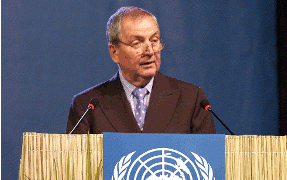
Photo: UNEP
As participation in the Global Compact continued to grow at rapid speed in 2002, the initiative introduced early elements of its emerging governance structure. In January 2002, the newly formed Global Compact Advisory Council, an interdisciplinary high-level body comprising leaders from business, civil society, labor, and academia, appointed and chaired by the Secretary-General, held its first meeting in New York to discuss the evolution and future direction of the initiative. In June 2002, the Global Compact Office released its first Progress Report, presenting a comprehensive overview of the Global Compact and progress made in the initiative’s core areas of activity.
At the World Summit for Sustainable Development, held in Johannesburg in September, the Global Compact and UNDP launched the Growing Sustainable Business (GSB) initiative, recognizing that – in the absence of sufficient investment in developing countries – the MDGs would not be achieved without a sustainable contribution by the private sector. Coordinated and managed by UNDP to this day, the GSB offers a platform for companies that seek to develop commercially viable business projects within their core business or value chain. GSB project have since been launched in 12 countries around the world.
On the national level, the year 2002 saw the launch of events for the Global Compact in Spain, Turkey, Ghana, and Italy, among others. By the end of the year, the number of participants had reached 600 organizations. As of November 2002, the Global Compact Office began releasing a full list of participants on its website.
- Partnership
June: Building Partnerships report published, which offers an overview of the growing cooperation between the United Nations and business - Education
June: Academic Network established - Local Networks
December: First Learning Network Forum (ALNF) in Berlin identifies knowledge and learning gaps
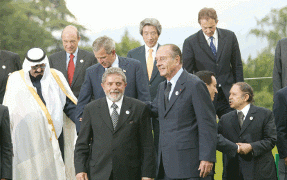
Photo: Présidence de la Republique France
In January 2003, the Global Compact Advisory Council met in New York for its third meeting. At the meeting, Council members recommended that companies – in order to increase transparency and accountability – should publish implementation examples as part of their annual reports. This recommendation marked a significant shift in the Global Compact’s strategic approach, which would eventually lead to the introduction of the Communication on Progress in 2005. In April 2003, the leaders of several global NGOs, including Amnesty International and Oxfam, wrote an open letter to then-Deputy Secretary-General Louise Fréchette, calling for “tangible evidence of progress arising from the Global Compact.” Echoing concerns raised by many civil society stakeholders during the Global Compact’s early years, the group urged strengthening the initiative’s accountability and proposed a number of measures, such as stricter monitoring of the Global Compact’s reporting requirement, as well as a mechanism to address perceived violations of the Global Compact Principles by corporate participants.
Also in May 2003, G8 finance ministers for the first time expressed support for the Global Compact. In a joint statement, the ministers encouraged “voluntary private sector initiatives that foster and complement such international efforts to promote corporate social and environmental responsibility as the OECD guidelines for Multinational Enterprises and the UN Global Compact Principles.” This support of the Global Compact’s role was further reiterated in the official G8 Declaration issued at the G8 Summit in Evian-les-Bains (France) in June 2003.
- COP
January: Advisory Group says companies should publish examples in annual reports – a shift in approach that leads to full COP concept - Human Rights
April: NGOs increase pressure on human rights and UN internalization processes - Partnership
May: Global Compact policy dialogue on HIV/AIDS - Local Networks
June: ALNF in Berne says Global Compact needs to create guidance - Financial Markets
October: Global Compact opens Nasdaq
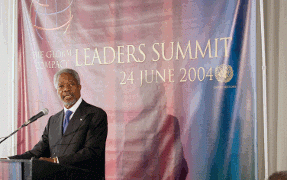
Photo: UN Photo/Mark Garten
The first Global Compact Leaders Summit took place in New York on 24 June 2004. At the time, it was the largest meeting of representatives from industry, civil society, trade unions and politics that had ever taken place under the auspices of the United Nations. There were a variety of motivations and objectives for the Leaders Summit: In just four years, the Global Compact had developed into the largest voluntary CSR initiative in the world, with well over 1,500 participants from more than 70 countries. What factors led to its success? What kind of experiences had corporations had with implementing the Ten Principles? What strategies were necessary to expand Global Compact implementation at a wider level? The participants in New York were called upon to address these questions and others, as well as to report on successes, problems and challenges. Numerous participants suggested that national and regional networks be strengthened and the decentralisation of the Global Compact intensified. The private-sector contribution to global development was an important element of this debate. Companies were asked to form partnerships with other actors from civil society in order to tackle concrete problems more effectively, with the Millennium Development Goals (MDG) mentioned as a particular driving force. Of course there was some criticism too: Representatives from NGOs and trade unions lamented that the Global Compact mechanisms did not include a method of verifying that the principles had been implemented and a way to demand that companies take action in urgent cases. The significance of the annual Communication on Progress was stressed in response; this newly introduced confidence-building measure would be required of participants and constitute proof of actual activity.
- Anti-Corruption
January: Global Compact convenes dialogue on transparency and the fight against corruption - Anti-Corruption
April: United Nations sets up inquiry into the Oil for Food program – underscores need for greater transparency - COP
June: Global Compact launches integrity measures - Anti-Corruption
July: Launch of UN Global Compact Principle 10 - Financial Markets
July: Who Cares Wins launched – ESG concept takes off - Human Rights
November: Launch of the Embedding Human Rights series
For the Global Compact, the year 2005 has brought not only further growth and new initiatives, but also major structural changes. What was required was to better link global strategies with local action, ensure integrity, improve the quality of businesses' commitment and give the companies and organisations involved a stronger share in the initiative's strategic and operational development. Consultation was entrusted to John G. Ruggie, who was then Special Adviser to the Secretary-General on the Global Compact, and Georg Kell, Executive Head of the Global Compact Office. SG Kofi Annan endorsed this new Governance Framework in August 2005 and launched the implementation process. In keeping with the Global Compact’s voluntary and network-based character, the governance framework is light, non-bureaucratic and designed to foster greater involvement in, and ownership of, the initiative by participants and other stakeholders themselves. Governance functions are shared by seven entities, each with differentiated tasks within a multi-centric framework including Leaders Summits, Local Networks, a Board, the GC office and the Inter-Agency Team.
- Partnership
April: Global Compact and OCHA launch new business guide on emergency aid - Anti-Corruption
December: UN Convention against Corruption enters into force - Partnership
December: UN General Assembly encourages Global Compact Office to promote partnerships - Local Networks
December: New guidance document for Local Networks released
2006-2010
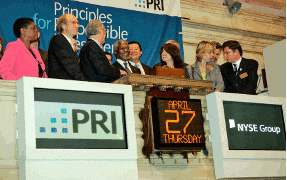
Photo: PRI-UN Photo/Evan Schneider
The Global Compact has developed over the years into a brand with global reach. In this way, the Initiative has made an important contribution to the internal reform of the United Nations. And that is being recognised: In September 2006, SG Kofi Annan emphasised the central role of the Global Compact as an interface between the United Nations (UN) and business. The Global Compact’s institutional strengthening is complemented by its global expansion. The fourth annual network forum, which brought more than 150 delegates to Barcelona in September 2006, was an expression of the Initiative’s growing expansion on all five continents.
The finance initiatives of the Global Compact opened new territory: In this connection, 27th April 2006 was a symbolic day. For the first time, a Secretary-General of the United Nations rang in the trading day at the New York Stock Exchange – a true innovation, since for many years the thematic distance between Wall Street and Kips Bay seemed too large. But the Secretary-General’s visit to the control centre of global capital had a concrete reason: It signalled the start of the Principles for Responsible Investment (PRI), a joint initiative of the Global Compact and the Finance Initiative of the UN Environment Programme (UNEP FI). This new PRI initiative rests on six principles, which were derived from the Global Compact.
- COP
March: Workshop discusses best practices in communicating progress - Financial Markets
April: Secretary-General launches Principles for Responsible Investment (PRI) - Local Networks
September: ALNF in Barcelona reaches consensus on own role as an element of the Global Compact’s governance structure - Environment
The Stern Review on the Economics of Climate Change was greeted with headlines worldwide when it was published - Education
October: Academic institutions agree to develop Principles for Responsible Business Education - Anti-Corruption
December: Global Compact hosts first board meeting of the Extractive Industry Transparency Initiative
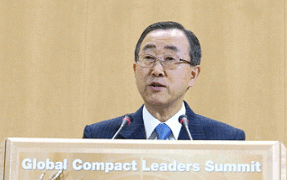
Photo: UN Photo/Eskinder Debebe
Local work played an especially significant role in the Global Compact in 2007. While there are still blanks on the map in the seventh year since the Initiative was founded, their number is declining. Among the largest companies in the Global Compact (by market capitalization), mining, the oil and gas sector and the utilities sector have well-above-average representation. No signatories, or only a few, can be found among the global leaders in the real estate sector, among mobile telephone companies and the media.
Of course, the main event of 2007 was the Global Compact Leaders Summit, whose second edition took place on 5th and 6th July 2007 in Geneva. The Summit set new directions for the Initiative’s future. With over 1,100 participants from more than 80 nations, it was the largest summit ever held by the United Nations on sustainable economic activity. As the Summit’s final document, participants approved the “Geneva Declaration”, whose 21 points again emphasise the importance of a values-conscious private sector for a sustainable global economy. Likewise, the Geneva Declaration calls on United Nations member states to offer government incentives, beyond regulations, for responsible business activity.
- Environment
March: Principles on Climate Leadership launched - Environment
July: Launch of initiatives Caring for Climate and CEO Water Mandate - Education
July: Business schools to advance corporate citizenship - COP
September: COP program becomes widely recognized - Human Rights
December: Global Compact begins year-long campaign to raise business awareness - Local Networks
December: Report issued – Local Networks Gaining in Strength and Impact
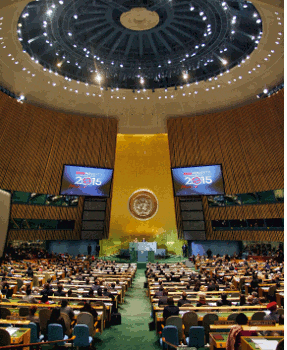
Photo: UN Photo/Marco Castro
When we look through the rear-view mirror at the often turbulent global events in 2008, we can say with great confidence that it was a year of profound changes, sharp breaks with the past and necessary new beginnings. The food price crisis of the first half of the year was followed by the long-smouldering financial crisis in the second. The ghost of recession is making its rounds throughout the world and, according to the latest research results, the threat from climate change is also progressing faster than was anticipated a short time ago. What we can perhaps learn initially from these developments is that, in future, companies will be measured more strongly than in the past on how well they are able to combine long-term sustainability and the profit motive in a credible and value-creating way. No question about it: the trust in a fair globalisation and the ability of free markets to regulate themselves – which has always been viewed with scepticism by some – has suffered considerable, though not irreparable damage.
As can already be seen, the crisis has also led many companies to re-evaluate their own sustainability approaches. In this context, we can perhaps talk about a “cleansing effect”. While purely philanthropic commitments have, as expected, already fallen victim to the first savings measures in many places, those approaches that regard company sustainability as a purely tactical, reactive (communication) task cannot withstand closer examination. In contrast, the question whether companies can “still afford” corporate responsibility in future becomes moot when sustainability management is considered a strategic priority. For worldwide economic developments notwithstanding, central challenges such as climate change or human rights, and with them the need for effective company strategies, will not disappear from the screen but rather gain in significance.
- Environment
April: Environmental leaders and champions gather in Singapore for the B4E Global Summit - Education
April: Principles for Responsible Management Education endorsed by over 100 business schools - COP
April: New functionalities improve access to Communication on Progress - Labour Standards
May: Global Compact Labor Working Group convenes inaugural meeting - Human Rights
June: United Nations extends mandate of the Special Representative on Business and Human Rights
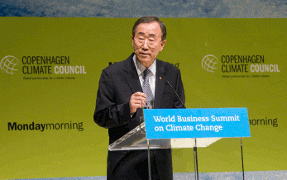
Photo: UN Photo/Eskinder Debebe
In spite of the global financial and economic crisis, it was an international crisis with far more grave consequences that dominated the Global Compact debate in 2009: the change in the climate. This is much more than just an environmental problem; climate change is the central challenge of our generation, with far-reaching consequences for sustainable development, the struggle against poverty, political and economic stability, and global security as well. What's more, solving climate change calls for more than just policy and technology; it will take an economic approach as well. In view of the difficult negotiations on a new climate agreement in December 2009 in Copenhagen, it seemed of primary importance in the Global Compact arena to bring economic and political decision-makers together for a dialogue. The high point of these efforts was the UN Leadership Forum on Climate Change, which was put on by the Global Compact and took place on 22 September as part of the UN Climate Summit in New York. Some 60 heads of state and heads of government from all over the world responded to the Secretary-General's invitation and exchanged experiences with top business leaders, in an event that was also something completely new to the United Nations.
- Human Rights
March: Global Compact and UNIFEM address role of business in empowerment of women - Environment
March: Water Disclosure 2.0 released - Environment
December: COP 15 - Local Networks
December: New anti-corruption guidance sharpens rules for reporting companies
„In 10 short years, that initiative has grown to become the
largest corporate citizenship and sustainability initiative in the
world.“
UN Secretary-General Ban Ki-moon
- Partnership
January: New UN business website brokers partnerships - Education
March: Principles for Responsible Management Education Initiative adopts governance framework
Matthias Stausberg is Head of Public Affairs & Media Relations and Spokesperson of the UN Global Compact
Dr. Elmer Lenzen is founder and CEO of the macondo publishing GmbH, publisher of the Global Compact International Yearbook and the CSR Academy. He has a PhD in Journalism and studied at the Universities of Münster, Bochum (both Germany) and the UCR in San José (Costa Rica). In 1998 Elmer founded macondo with major business areas in publications and corporate communication. CSR plays a prominent role and macondo today is one of the leading publishing houses.
About Us // Privacy Policy // Copyright Information // Legal Disclaimer // Contact
Copyright © 2012-2018 macondo publishing GmbH. All rights reserved.
The CSR Academy is an independent learning platform of the macondo publishing group.









